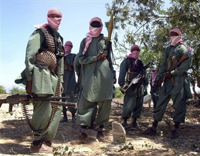Somalian People are Hungry but Suspicious and Aggressive
The U.N.'s World Food Program (WFP) has suspended its work in much of southern Somalia due to threats against its staff and unacceptable demands by al Shabaab rebels controlling the area.

The WFP has been central to international efforts to address an acute humanitarian crisis in the drought- and conflict-torn Horn of Africa nation. Experts say half the population need aid.
"Unacceptable conditions and demands from armed groups have disrupted WFP's ability to reach many of the most vulnerable people in southern Somalia," spokesman Peter Smerdon told reporters. "Despite this suspension, WFP remains active in much of central and northern Somalia, including the capital Mogadishu."
He added, however, that it was virtually impossible to reach up to 1 million women, children and other highly vulnerable people. About three-quarters of the 3.76 million Somalis who need aid are concentrated in central and southern regions.
Most of those areas are controlled by the al Shabaab rebel group, which Washington says is al Qaeda's proxy in Somalia.
"The food stocks are out ... Most equipment has been brought out and vehicles have been brought, as well as obviously all our staff," the WFP representative said. "Staff safety is a key concern for WFP."
A senior al Shabaab official reached by telephone in the southern port of Kismayu was jubilant at news of the suspension.
"It is our great pleasure to see WFP and the other spy agencies suspend their involvement in Somalia ... We will never allow them to come here again," Sheikh Ibrahim Garweyn, head of public affairs in the rebel-held port, told reporters.
"We have great land and we can grow our own crops."
In November, al Shabaab's self-styled "Office for the Supervision of the Affairs of Foreign Agencies" accused WFP of devastating local agriculture by importing relief rations.
The turmoil in Somalia has spilled into the waters of the strategic Gulf of Aden and Indian Ocean, where Somali pirates have driven up insurance costs and made tens of millions of dollars in ransoms by hijacking ships and their crews.
A former Islamist rebel, Sheikh Sharif Ahmed was elected president in January. While there were hopes he would be able to reconcile with the insurgents, he has made little headway and his government controls only a few blocks of Mogadishu.
Rival rebel groups also routinely fight for territory, according to the Reuters Canada.
Subscribe to Pravda.Ru Telegram channel, Facebook, RSS!


